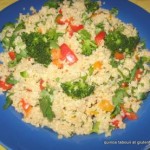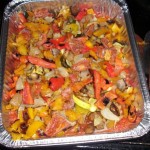The scoop on arsenic, recipes, a giveaway and more below!
There’s been recent headlines about levels of arsenic in rice due to a study published last week. The gluten-free community tends to eat a LOT of rice, so this is pretty important news! Think about it: many gluten-free folks are eating Rice Chex with breakfast, some rice bread with lunch, a few rice crackers for snack and maybe rice pasta with dinner. Arsenic is potentially cancer promoting and may affect brain development and IQ in growing children. A recent Consumer Reports study indicates “worrisome” levels found in food. Currently there are no federal regulations for food, and now groups are suggesting people limit the amount of rice they consume.
Why would there be arsenic in rice? Generally, the arsenic in rice is a byproduct of soil levels and the amount in water, and rice is often flooded. Many regions where rice is grown have high levels, and/or use pesticides with high levels of arsenic.
The gist:
- Brown rice has higher levels of arsenic than white rice
- If you eat it frequently (and if you’re eating most g-free products daily, most likely that means you) Consumer Reports recommends to cut back to just 2-3 serving per WEEK, with less for babies and children.
- Pregnant women, children and babies are at particular risk
- Consumer Reports recommends cutting back, because studies show that the more rice you eat, the more arsenic is in your body.
- FDA recommends “wait and see”
- My take: since g-free folks tend to eat a LOT of rice, we’re the most likely to be affected. Looking into other options simply makes sense, and the worst that can happen is you broaden your horizons.
- The study details are here
- AND a reader kindly forwarded me a Change.org petition for the FDA to set limits on arsenic in rice. Thanks, Anna!
So there are several good options:
- Change the way you cook your rice, by using more water and discarding it. Consumer Reports has more details here
- It seems like some kinds of rice, like basmati, tend to have lower levels of arsenic
- Vary your grains—they are all grown differently and in different climates, regions, etc. and the belief is that other grains have lower arsenic levels:
- Millet—I made this Cinnamon Apple Millet breakfast cereal at a DC Celiacs meeting a while back. It’s easy and yummy, too!
- Teff—my hubby’s favorite chocolate banana bread is teff based, and these hazelnut teff cookies are delish.
- Sorghum
- G-free oats
- Corn—polenta, grits, pasta…the possibilities are endless!

- Go for pseudograins:
- Quinoa-this is my favorite Italian style quinoa pilaf, or try this Quinoa Tabouli from GFE
- Amaranth
- Buckwheat—King Soba noodles are 100% GF, and Bob’s Red Mill has Creamy Buckwheat Cereal
- Incorporate of grain-free options. Nowhere is it written that you *must* eat grains for good health! We often talk about how healthy grains are because of the B vitamins and fiber, but those nutrients can come from a variety of grain-free sources, too.
Tasty grain-free options:
- Sweet potatoes
- White potatoes
- Parsnips, turnips, carrots and other root veggies

- Butternut and acorn squash are seasonal and have a nice carb-y texture
- Beans and lentils–chili season is around the corner
- Eden Foods has Mung Bean Thread noodles that are tested to be gluten-free
- Cauliflower “rice” from Elana’s Pantry or even Roasted Cauliflower
- Cassava (these are my very favorite cassava crackers)
- Zucchini “pasta” from Kalyn’s Kitchen
- Spaghetti squash pasta from Jules Gluten Free
- Bean based pizza crust from Diet Dessert and Dogs
- Chestnut crepes—the fun never ends!
- Traditional Brazilian style cheese bread is made from tapioca. Chebe is one brand, and here’s a recipe by Ginger Lemon Girl
- There are lots of almond flour recipes and coconut flour recipes…more than I can count! Elana’s Pantry, Paleo Parents, the Spunky Coconut , Gluten Free Happy Tummy and many more.
I’m actually mildly allergic to rice and have been many years, so my recipe blog contains very few recipes with rice. There’s even rice-free bread!
Tricia Thompson has a nice interview with more info here, too.
Variety is the spice of life. It makes sense to venture out beyond the rice bowl! Feel free to leave your favorite tips for including foods other than rice in the comments.
Upcoming Event:
Celiac Sprue Association is hosting its 35th Annual Conference on October 4-6th on Long Island in Hauppauge, NY. There will be great sessions on the latest and greatest from the Columbia Celiac Center, dietary tips, gluten-sensitivity, and panels on gluten-free blogging, travel, dining out and much more.
Giveaway #2
Nourishing Meals is a great cookbook which was just released. It just so happens to contain a variety of grains and grain-free recipes, and I’m giving away 2 signed copies. The giveaway ends Weds, so hop on over
Cheryl Harris, MPH, RD is a Registered Dietitian, Nutritionist and Certified Wellness Coach in Fairfax & Alexandria, VA. Cheryl works with people to feel and look their best with a range of specialties, including Celiac Disease, food allergies, pregnancy, breastfeeding, vegetarian and vegan diets, preventing diseases and “whole foods” eating. Let’s get you on your way to achieving your goals. Email her or call 571-271-8742.
